Tripatini
the world's smartest travel social network
Out of Africa
With sincere apologies to Karen Blitzen, I nicked that title to attract readers, a brazen move to be sure.
The more you get to know about any subject, the more you realize you do not know about that subject. Some smart guy said that once, I think he was Greek. I now know a lot more about Kenya after one week as a tourist than I did before, that’s for certain. I now have deep desire to learn a whole lot more.
We were “on safari.”
A safari is an overland journey, usually a trip by tourists to Africa. Traditionally, the term is used for a big-game hunt, but today the term often refers to a trip taken not for the purposes of hunting, but to observe and photograph animals and other wildlife. There is a certain theme or style associated with the word, which includes khaki clothing, belted bush jackets, pith helmets or slouch hats, and animal skins. Entering the English language in the late 19th century, the word safari means “long journey” in Swahili. Originally from the Arabic (safar) meaning a journey. -Wikipedia
Yes, we wore khaki. We read before we left that mosquitoes boycott khaki. Luckily khaki is a popular color among the Indian and Pakistani workers here in the UAE, so I was able to buy mine at discount stores. No, I did not wear a pith helmet or a slouch hat. Ball caps for this boy, I’d wear one to the moon baby. No belted bush jacket, although I saw a lot of them on people and in the hotel gift shops, and I think they are pretty cool. No Animal skins either. I guess I could have acquired an animal skin loin cloth and worn it like Johnny Weissmuller, but I’m sure my wife would have objected. She is much more levelheaded than I am.
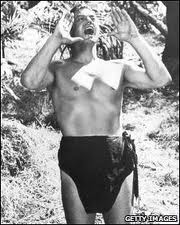
Maybe she wouldn’t have objected if I looked like Johnny Weissmuller, but I digress.
We did take what amounted to a long journey, even though we were only in country for a week. We traveled south, then north, then south then north. We went from 2 degrees south of the equator, to 4 degrees, to half a degree, to 4 degrees and back to half a degree. We did not plan it, our tour agency did. I do not think the itinerary was established by availability of the lodges. It was not high season yet and none of the lodges were full. Consequently I am not sure why we bounced up and down like a basketball.
However, I have no complaints. Every drive we made was exciting. Every little town we passed through was in its own way colorful.
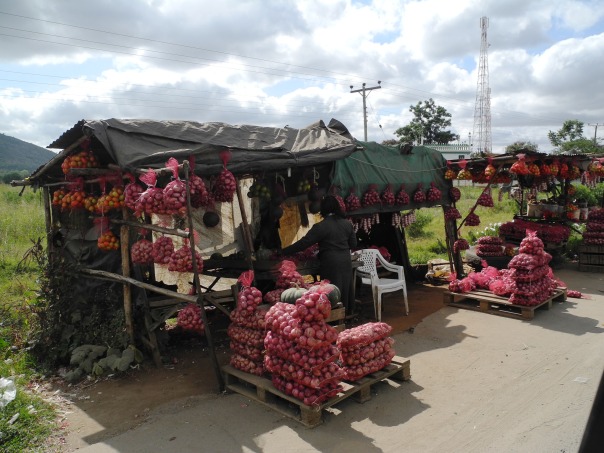
...with entire streets of veggie stands loaded up with red onions, I cannot imagine them being expensive. The lodges all had red onions in the salads, of course.
The towns were separated by miles and miles of absolutely beautiful open country. My mind, which sometimes works like a jukebox, started playing the old Who refrain, “I can see for miles and miles and miles and miles and miles.” Mary Ann who stares at a computer screen all day said “This is so good for my eyes.” Even in the "big sky" country of Montana, the vistas are broken up by the Rocky Mountains eventually. Not here.
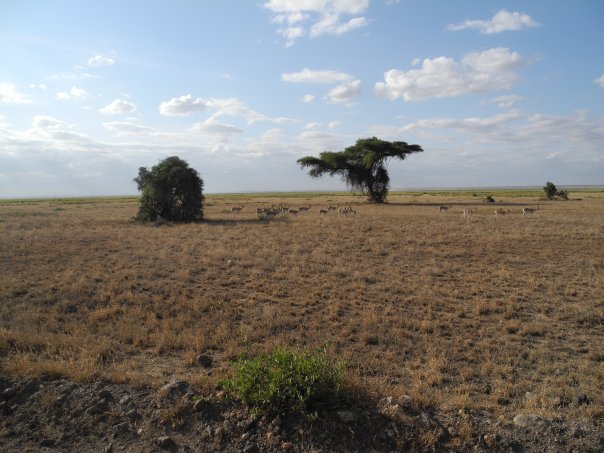
The vistas just went on forever.
Kenya is not as clean as Hong Kong, but nowhere near as dirty as some other paces we have seen in our travels. It was only littered in small villages; the countryside was pristine. We did see a few plastic water bottles tossed on the ground in the parks, though (we even spotted a baboon trying to drink from one). I was so humored that I forgot to get a photo - damn. But whoever disposes of anything - even a cigarette butt in a park - should be fed to the hyenas.
Speaking of smoking…
Kenya is most definitely against smoking. They should just hang a no smoking sign at the immigration desk and write below it, Anywhere. When we got to our first hotel, in Nairobi, I walked well away from the front door, across the driveway, and stood in some bushes to light up. I have learned to be this “respectful” of the no smoking fascists in the world, the ones who think if they SEE someone smoking they too will die of cancer. Anyway, just as I lit up, a hotel doorman came running across the driveway and said “You cannot smoke in public in Kenya. You can be arrested for that.” I put out the cig and asked him “Is there anywhere I CAN smoke?” He said, “By the pool.” The illogic of that aside, at least I had a place to indulge my habit without going to jail. For the rest of the trip, I hid behind buildings or elephants, snuck into cactus fields and otherwise obfuscated my custom. I will digress here long enough to say that if someone bans cigarettes worldwide, I will somehow obtain them on the black market and defiantly blow smoke up the UNs arse.
The national language of Kenya is English. It is the primary language of instruction in school. Kenyans also speak Swahili, or a version of it they call Kiswahili. They also speak one of 40 or so tribal languages, such as Masai or Kikuyu.
The dominate religion is Christianity, at about 70%. Islam is second and Hindu third. Arab traders, mostly from Oman, came to what is now Kenya even before the Europeans, sometime in the first century A.D. They stayed mainly on the coast, and that is where you will find most of the mosques. The Hindu religion was brought to Kenya by early traders, but mostly by the people building the railroad. At first, the majority of the Christians were Catholic. Catholicism was brought by The Portuguese explorer Vasco da Gama. Portuguese and Spaniards never went anywhere without priests. Later when the Brits colonized Kenya, Protestant missionaries zealously came to save Kenyan souls from Papal dominance. They were fairly successful. The Christians in Kenya are anywhere from 35 to 50% Catholic now. That % is lowering as ecumenical zealots continue to recruit.
Maize is the primary non-meat staple, I asked our guide if he knew what they Masai ate before they had Maize. He said, “We have always had maize.” I then had to disappoint him and tell him that Maize did not exist in the Eastern hemisphere in pre-Columbian times (That and tobacco, so there) He was surprised to learn that. It was maybe the only question I stumped him on all week.
Coffee in Kenya is amazingly good. I have always believed the best coffee comes from Costa Rica, but I am now reconsidering. There is not a single Starbucks in Kenya, to my amazement. Starbucks stores worldwide often sell Kenyan coffee so I do not know why no store in Kenya. Kenyans will tell you that their beans are often blended with other country’s beans to improve the taste. All I know is that it is wonderful, so I bought home a whole bunch of it.
If you ever saw the movie Out of Africa, you will remember that the main character had a coffee plantation. Her name was Karen Blixen. By the way, seems how I stole the title of this post, I’ll tell you to read the book. The film is LOOSELY based on Karen Blixen’s masterpiece of a memoir. Her farm was just outside of Nairobi. There is a town there now, called…hmmm… Karen. There is a museum to her efforts as a single white woman to make it in a foreign culture where even the fellow expats, dominated by Great White Hunter types, was not easy. Karen is a very wealthy suburb now. Beautiful homes, a first rate mall and world class hospitals. In the movie Blixen is played by Meryl Streep and the role of Denys Finch Hatton is played by Robert Redford.
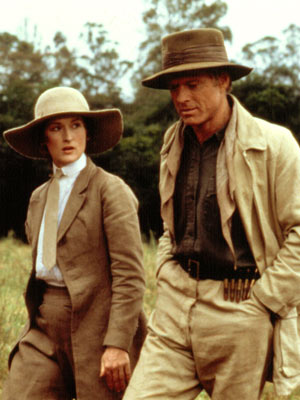
Both Streep and Redford would look good in rags. If I could carry off this safari look the way he did, I would have.
In the movie, Finch Hatton introduces the concept of travelling from hunt to hunt by plane. That idea still exists big time in Kenya. Now of course you travel between national parks on your airborne safari. Many very upscale lodges have their own airstrips, including one called Denys Finch Hatton Lodge www.finchhattons.com. I am not personally experienced with this lodge nor this level of luxury, so no endorsement, but check it out.
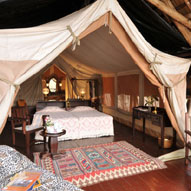
Not bad for a "tented lodge". You can sip champagne and watch the big game stroll in front of you wile sitting in a lounge chair.
The national beer, Tusker is damn good. it is about US$2.50 a bottle anywhere you go.
Whenever I am in a new country I look at it as a possible place to retire. Weather, cost of living, political stability, friendliness of the locals, and whether or not I can smoke in peace are all factors I consider. Kenya is now, without any truly deep investigation, second on my list behind Thailand, with a bullet.
I need to go back. I’ll wait until high season is over. This time I will go at a more leisurely pace and ask a lot more questions.
Just a couple more things. Overall, my new camera, A Nikon p7000 is an extremely good product. I am happy with my photos that I shared with you in the previous blogs. I said I was afraid they would all come oput looking like elephant dung.
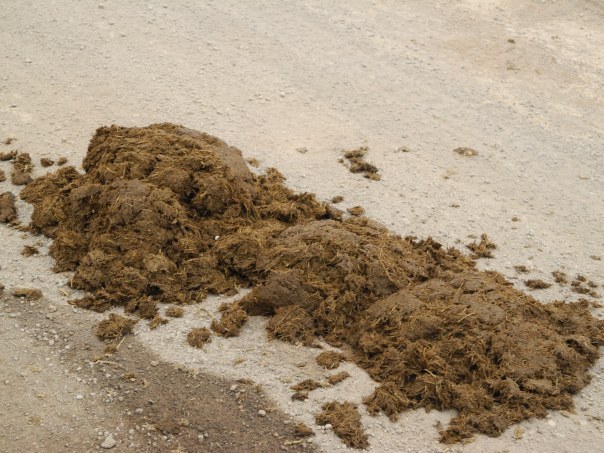
So here is some fresh elephant dung to compare the rest of them too! Like I always say, a complete service blog!
One last thing. In all my travels I have shared the local versions of the washroom signs that can sometimes be confusing.
Comment
-
Comment by Ed Wetschler on June 21, 2012 at 9:21am
-
Forrest, confusing rest room signs have caused me to make some embarrassing mistakes in my life; I'm glad you're paying attention.
Everyone else: The Kenya v. Tanzania safari debate sometimes gets more heated than a discussion on the old Jerry Spring Show. Here's a glimpse of the pro-Tanzania view: http://www.tripatini.com/profiles/blogs/what-makes-tanzania-safaris...
-
Comment by Sam Scribe on June 20, 2011 at 9:13am
-
A great read, Forrest, even for a non-smoker.
Videos
Groups
-
India
173 members
-
Tour Operators
873 members
-
Ireland
93 members
-
South Dakota
17 members
-
Azerbaijan
17 members
-
Shopping the World
55 members
-
Tech for Travel/Hospital…
87 members
-
Andorra
26 members
-
Online Corner
75 members
-
Minnesota
22 members
-
Backpackers & Hostels
84 members
-
Portugal
60 members
-
Turks and Caicos
26 members
-
Agritourism/Farmstays
72 members
-
Zambia
21 members
© 2025 Created by EnLinea Media.
Powered by
![]()
Badges | Report an Issue | Privacy Policy | Terms of Service
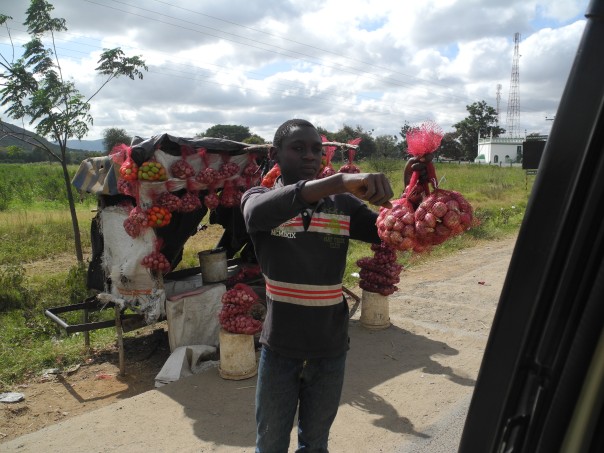
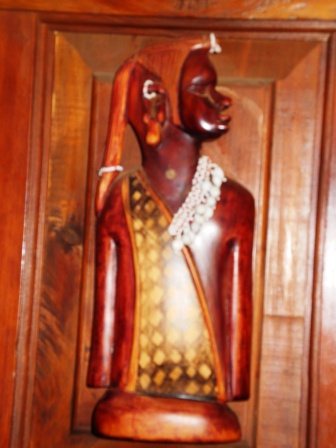
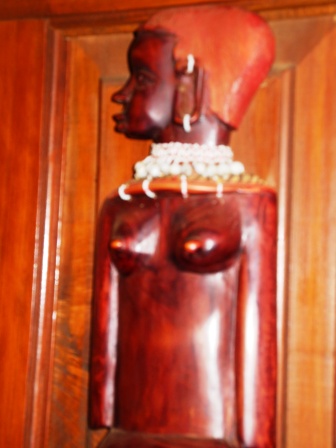
You need to be a member of Tripatini to add comments!
Join Tripatini